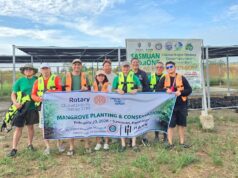BONGABON, Nueva Ecija – An “impending disaster” on peace and order was aborted by elements of the Philippine Army’s 71st Infantry Battalion when they uncovered six homemade landmines in a hinterland area of Sitio Tamale, Barangay Digmala here, the military reported on Tuesday.
This as Major Gen. Ralph Villanueva, commander of the 7th Infantry Division (7ID) urged the people to condemn the buying of the landmines in an area where innocent people could fall victims.
“I enjoin all concerned citizens, members of the civil society and NGOs (non-government organizations) to condemn this terrorist act of the CPP/NPA [Communist Party of the Philippines-New People’s Army],” Villanueva said in a statement.
Brig. Gen. Emmanuel Bautista, commander of the 702nd Infantry Brigade, said the landmines were placed in a container and buried underground.
Each landmine has the capability of blowing up large vehicles like M35 6×6 truck being used by the military or a civilian passenger bus, the military said.
The landmines weigh five to seven kilos and were configured with materials that cannot be recognized even by the landmine detectors.
Bautista said the retrieval operation, which was conducted on July 4 with the aid of Explosive Ordnance Disposal (EOD) team and bomb sniffing dogs, was carried out based on information fed by a former NPA rebel.
The military defined landmines as basically explosive devices that are designed to explode when triggered by pressure or a tripwire. These devices are typically found on or just below the surface of the ground. The purpose of mines when used by armed forces is to disable any person or vehicle that comes into contact with it by an explosion or fragments released at high speeds.
The CPP/NPA has developed a capability to manufacture crude homemade landmines, the government security force stressed.
The rebel returnee divulged that the group planned to use the landmines against unwary government forces plying along the stretch of the Pantabangan-Canili-Baler national road, a highway mostly frequented by civilian commuters, said Major Lito Pangatungan, of the 702nd Brigade.
He added that the last recorded use of landmines by the CPP-NPA in the area was in 2002 along the Pantabangan-Canili-Baler national road.
Incidentally, the use of landmines is banned by the United Nations and the International Community for its employment will endanger the lives of innocent civilians.
“Their plan of employing these landmines is a manifestation that they had no regard for the value of human life and the human rights of every individual,” Villanueva said.
He added: “These landmines, once employed, will endanger civilians not party to the conflict especially those commuters plying the Pantabangan-Canili-Baler highway. Lives of thousands of commuters will be at risk had these landmines not been discovered by our operating troops.”
This as Major Gen. Ralph Villanueva, commander of the 7th Infantry Division (7ID) urged the people to condemn the buying of the landmines in an area where innocent people could fall victims.
“I enjoin all concerned citizens, members of the civil society and NGOs (non-government organizations) to condemn this terrorist act of the CPP/NPA [Communist Party of the Philippines-New People’s Army],” Villanueva said in a statement.
Brig. Gen. Emmanuel Bautista, commander of the 702nd Infantry Brigade, said the landmines were placed in a container and buried underground.
Each landmine has the capability of blowing up large vehicles like M35 6×6 truck being used by the military or a civilian passenger bus, the military said.
The landmines weigh five to seven kilos and were configured with materials that cannot be recognized even by the landmine detectors.
Bautista said the retrieval operation, which was conducted on July 4 with the aid of Explosive Ordnance Disposal (EOD) team and bomb sniffing dogs, was carried out based on information fed by a former NPA rebel.
The military defined landmines as basically explosive devices that are designed to explode when triggered by pressure or a tripwire. These devices are typically found on or just below the surface of the ground. The purpose of mines when used by armed forces is to disable any person or vehicle that comes into contact with it by an explosion or fragments released at high speeds.
The CPP/NPA has developed a capability to manufacture crude homemade landmines, the government security force stressed.
The rebel returnee divulged that the group planned to use the landmines against unwary government forces plying along the stretch of the Pantabangan-Canili-Baler national road, a highway mostly frequented by civilian commuters, said Major Lito Pangatungan, of the 702nd Brigade.
He added that the last recorded use of landmines by the CPP-NPA in the area was in 2002 along the Pantabangan-Canili-Baler national road.
Incidentally, the use of landmines is banned by the United Nations and the International Community for its employment will endanger the lives of innocent civilians.
“Their plan of employing these landmines is a manifestation that they had no regard for the value of human life and the human rights of every individual,” Villanueva said.
He added: “These landmines, once employed, will endanger civilians not party to the conflict especially those commuters plying the Pantabangan-Canili-Baler highway. Lives of thousands of commuters will be at risk had these landmines not been discovered by our operating troops.”




